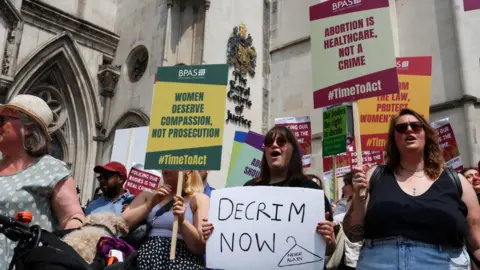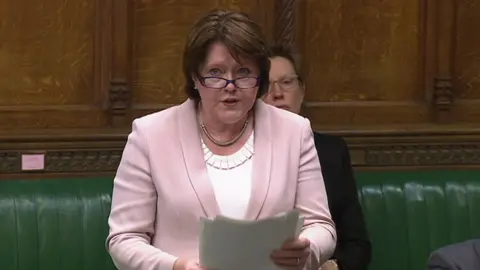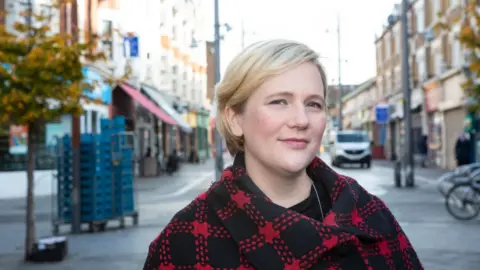Ex-minister Maria Miller calls for abortion sentencing guidelines
 Reuters
ReutersA former Conservative minister has called for new sentencing guidelines to prevent women being jailed for taking abortion pills after the legal time limit.
It comes after the imprisonment of a mother-of-three last month under a 162-year-old law.
Dame Maria Miller called for "compassion not punishment".
Downing Street has previously said there are no plans to change abortion laws or sentencing guidelines.
The case of 45-year-old Carla Foster sparked outrage from some MPs when she was sent to jail for two years, having been found guilty of inducing an abortion after the legal limit during lockdown under the 1861 Offences Against the Person Act.
Her sentence has now been halved by the Court of Appeal and she will also be released from prison.
 UK Parliament
UK ParliamentDame Maria, a former equalities minister, presented her bill to Parliament using a 10-minute rule motion, which allows backbench MPs 10 minutes to outline their proposals.
She told MPs that judges are reliant on Victorian legislation without modern sentencing guidance.
Providing "compassionate" guidance would mean Ms Foster's "heart-breaking situation could have been avoided altogether", she said, and she "would not have had to endure weeks of prison away from her children".
The MP for Basingstoke said the reason the law was originally introduced was to try and prevent women dying during backstreet abortions.
"We now live in a time where abortion is far less dangerous than giving birth so there's been a complete change," she said.
"The fair and equal treatment of women matters and abortion is the only medical procedure in the UK subject to the criminal law.
"Women who find themselves having an abortion outside of the law for whatever reason deserve our compassion, not punishment."
Dame Maria said she wanted to see far more wide-reaching reform, "taking women seeking abortion away from the sanctions of criminal law", but that this bill would be "a small step in the right direction".
She added the government would not bring forward its own legislation as the issue of abortion is a matter of conscience and should "come from the backbenches" to avoid party politics.
 Getty Images
Getty ImagesHowever, Labour MP for Walthamstow Stella Creasy, said the 1861 Act should be scrapped altogether.
She told MPs the bill "could actually end up make things worse" by normalising the criminalisation of women over abortion.
Ms Creasy said no "sensible, modern law" could be based on the 1861 Act, which she said also criminalises "obstructing a clergyman", and highlighted concerns around women being investigated for "a healthcare decision".
There had been 67 prosecutions in the UK under the 1861 Act in the last 10 years, Ms Creasy said, and Home Office data showed 40 women were investigated in 2021.
Ms Creasy did not take the issue to a vote, meaning the bill passed its first stage with cross-party support, including from the Commons' longest serving male and female MPs - known as the Mother and Father of the House - Labour's Harriet Harman and Tory Sir Peter Bottomley.
However, the bill is unlikely to make further progress in its current form without government support.
